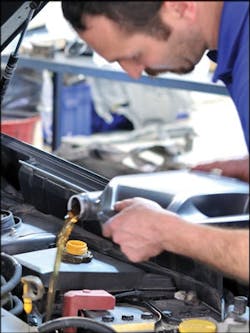According to a recent study by J.D. Power & Associates, vehicle dependability is now at new, record levels. The annual study surveyed more than 31,000 owners of 3-year-old cars (in this case, vehicles made in 2009). To determine overall dependability, the study measured the number of problems experienced per 100 vehicles (PP100) during the prior 12 months. The lower the score, the more dependable the vehicle.
In the end, the study revealed an average PP100 of 132 in 2012, an improvement of 19 points from 2011. Since the 2009 vehicle dependability survey, the PP100 among all vehicles has improved at an annual rate of 8 percent to today’s historically low numbers.
Jeffrey Patti, a consultant and owner of Brandtley Automotive Consultants, LLC, says this is great news for car owners and manufacturers—not so much for repair shops. And many in the auto repair industry feel that the increase in vehicle dependability recent will signal a change in shop operations during the next several years.
“There are less problems with cars, but (shop owners) still want high car counts in their shops,” says Scott Weaver, owner of Superior Auto Electric in Tulsa, Oklahoma. “To do that, you need to have more reasons for (customers) to come in.”
That means becoming experts in new technologies and, most importantly, focusing on maintenance services.
As the founder of Autoshopowner.com, a website created to provide shop owners a forum for open discussion regarding their industry, Joe Marconi has already noticed this trend among shops. In fact, when he expanded his own shop—Marconi owns Osceola Garage in Baldwin Place, N.Y.—a couple of years ago, he added five more bays with the intent of each being used for maintenance work.
“Every vehicle and every machine made in the past, present, future, will need maintenance,” Marconi says. “That will never go away, even if cars break down less often.”
Getting customers to come in for more regular maintenance work may be the challenge, though. Marconi, Weaver and Patti all gave some advice on how a shop can do this:
Promotions. Free inspections, whether for particular issues (like brakes, clutch, etc.) or the entire vehicle, can be great ways to get people into your shop, Patti says.
“It can do a couple things,” Patti says. “First, you’re creating some goodwill with customers by giving them something for free, and second, you might see that, for instance, the brakes are really worn down or something like that. You might not make any money off the inspection, but you can get some additional business from having them come in the shop and build that trust and relationship with them.”
Weaver says creating advertising campaigns around maintenance is important, too. Most people know to come in when a car breaks down; they might not think about it when it’s still running fine, he says.
Diversify your shop. Marconi suggests branching out. Instead of just repairs, he says to put more emphasis on diagnostics and other electronic services a customer can’t do on their own.
“These cars that aren’t breaking down have much more technology in them,” Marconi says, “and they will need a higher level of expertise and servicing, with all the advanced systems and technology.”
Weaver, whose shop mainly focuses on electrical issues, says working with various “ad-ons” to vehicles can give business a boost, too. Installing and fixing GPS and entertainment systems, for example, can turn into a huge bonus for business.
Be proactive. The fact is, Marconi says, items like brake pads, tires and clutches will still wear out.
Marconi and Weaver both say to be proactive when cars are in your shop: Check everything for wear and tear and talk to customers repeatedly about the importance of regular maintenance.
“I think of it like going to the doctor,” Marconi says. “If I went in because I hurt my shoulder playing racket ball, the doctor is still going to check my heart rate, blood pressure and all that stuff. That’s his job.
“It’s the same thing for us. You have to give that total car-care package, and you have to let customers know what you found."
About the Author

Bryce Evans
Bryce Evans is the vice president of content at 10 Missions Media, overseeing an award-winning team that produces FenderBender, Ratchet+Wrench and NOLN.
